Food: the best way to experience culture on your next vacation
Can you think of anything that immediately connects people more than “breaking bread” together? A universal truth is that food is an important part of everyone’s cultural heritage and individual identity. We all have favourite foods which generally fluctuate throughout the year based on what plants are in season and which recipes our family have traditionally enjoyed during the holidays. Food brings friends and families together, connects us to people and places, and engages all of our five senses in order to create unforgettable memories.
 Cuisine in the Amazon Rainforest is truly unique. If you haven’t travelled there yet and had the chance to taste local delicacies, you’re missing out. Communities such as the indigenous Kichwa in Ecuador have kept their ancient Amazonian culture alive and strong. They are happy to share their knowledge of the tasty and sustainable local foods that you can try on your next vacation.
Cuisine in the Amazon Rainforest is truly unique. If you haven’t travelled there yet and had the chance to taste local delicacies, you’re missing out. Communities such as the indigenous Kichwa in Ecuador have kept their ancient Amazonian culture alive and strong. They are happy to share their knowledge of the tasty and sustainable local foods that you can try on your next vacation.
 Visitors are treated with the primal experience of sitting by a crackling wood fire while the preparations unfold before you. Traditional recipes start with maintaining a direct connection to the land through the collection of natural resources like delicious fresh fish or the more exotic option of skewered palm worms. The fire lends itself beautifully to the incredibly clever method of roasting food in the traditional way by wrapping food in bijao leaves. This helps infuse the meat with fresh spices such as wild garlic or chili… simply delectable!
Visitors are treated with the primal experience of sitting by a crackling wood fire while the preparations unfold before you. Traditional recipes start with maintaining a direct connection to the land through the collection of natural resources like delicious fresh fish or the more exotic option of skewered palm worms. The fire lends itself beautifully to the incredibly clever method of roasting food in the traditional way by wrapping food in bijao leaves. This helps infuse the meat with fresh spices such as wild garlic or chili… simply delectable!
 But sustenance goes far beyond feeding our bodies; it also feeds our souls. Amazonian cultures have known this since time immemorial. To help you get back in touch with such ancient knowledge, you have to try drinking Guayusa tea. A medicine woman acts as a guide through an authentic Guayusada ritual which is said to feed, cleanse, and rejuvenate the soul. You are invited to describe dreams you have had in order to have their meanings interpreted and get practical, personalized advise to help your spirit heal and grow.
But sustenance goes far beyond feeding our bodies; it also feeds our souls. Amazonian cultures have known this since time immemorial. To help you get back in touch with such ancient knowledge, you have to try drinking Guayusa tea. A medicine woman acts as a guide through an authentic Guayusada ritual which is said to feed, cleanse, and rejuvenate the soul. You are invited to describe dreams you have had in order to have their meanings interpreted and get practical, personalized advise to help your spirit heal and grow.
 This plant does not grow anywhere else on Earth, so drinking a natural infusion of its leaves is very special. The plant is sacred to the Kichwa because of its historic cultural significance based on its natural health benefits and healing properties. Guayusa is full of caffeine which, if you’ve ever enjoyed a cup of coffee or steeped tea, you know is invaluable especially first thing in the morning! This tea’s short-term effects give you an overall sense of well-being and happiness because it helps kick your metabolism into gear and energize your body for the day ahead. In the long-term, its anti-inflammatory effect soothes conditions caused by inflammation such as the symptoms of arthritis. These positive spiritual and physiological effects are exactly what you need to rejuvenate both mind and body, and escape the winter blues.
This plant does not grow anywhere else on Earth, so drinking a natural infusion of its leaves is very special. The plant is sacred to the Kichwa because of its historic cultural significance based on its natural health benefits and healing properties. Guayusa is full of caffeine which, if you’ve ever enjoyed a cup of coffee or steeped tea, you know is invaluable especially first thing in the morning! This tea’s short-term effects give you an overall sense of well-being and happiness because it helps kick your metabolism into gear and energize your body for the day ahead. In the long-term, its anti-inflammatory effect soothes conditions caused by inflammation such as the symptoms of arthritis. These positive spiritual and physiological effects are exactly what you need to rejuvenate both mind and body, and escape the winter blues.
 Food can be a key way to connect with strangers on a personal level and learn a little about other unique cultures. So no matter which far-flung corner of the world you visit on your next big trip, remember to bring your appetite for adventure! Your senses of sight, sound, smell, touch, and taste will thank you for many years to come.
Miguel Andy is General Manager of Napo Wildlife Center. Napo Wildlife Center is an eco-lodge offering unforgettable experiences in the Amazon rainforest of Ecuador, inside Yasuni Biosphere Reserve, which is managed by the Añangu kichwa aboriginal community.
If you would like to be a guest blogger on A Luxury Travel Blog in order to raise your profile, please contact us.
Food can be a key way to connect with strangers on a personal level and learn a little about other unique cultures. So no matter which far-flung corner of the world you visit on your next big trip, remember to bring your appetite for adventure! Your senses of sight, sound, smell, touch, and taste will thank you for many years to come.
Miguel Andy is General Manager of Napo Wildlife Center. Napo Wildlife Center is an eco-lodge offering unforgettable experiences in the Amazon rainforest of Ecuador, inside Yasuni Biosphere Reserve, which is managed by the Añangu kichwa aboriginal community.
If you would like to be a guest blogger on A Luxury Travel Blog in order to raise your profile, please contact us.
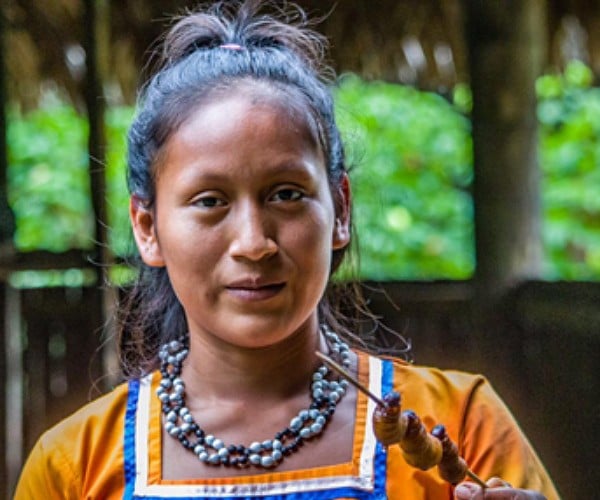 Cuisine in the Amazon Rainforest is truly unique. If you haven’t travelled there yet and had the chance to taste local delicacies, you’re missing out. Communities such as the indigenous Kichwa in Ecuador have kept their ancient Amazonian culture alive and strong. They are happy to share their knowledge of the tasty and sustainable local foods that you can try on your next vacation.
Cuisine in the Amazon Rainforest is truly unique. If you haven’t travelled there yet and had the chance to taste local delicacies, you’re missing out. Communities such as the indigenous Kichwa in Ecuador have kept their ancient Amazonian culture alive and strong. They are happy to share their knowledge of the tasty and sustainable local foods that you can try on your next vacation.
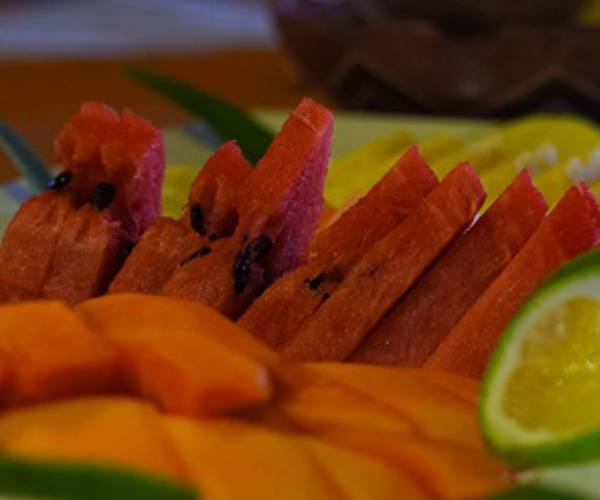 Visitors are treated with the primal experience of sitting by a crackling wood fire while the preparations unfold before you. Traditional recipes start with maintaining a direct connection to the land through the collection of natural resources like delicious fresh fish or the more exotic option of skewered palm worms. The fire lends itself beautifully to the incredibly clever method of roasting food in the traditional way by wrapping food in bijao leaves. This helps infuse the meat with fresh spices such as wild garlic or chili… simply delectable!
Visitors are treated with the primal experience of sitting by a crackling wood fire while the preparations unfold before you. Traditional recipes start with maintaining a direct connection to the land through the collection of natural resources like delicious fresh fish or the more exotic option of skewered palm worms. The fire lends itself beautifully to the incredibly clever method of roasting food in the traditional way by wrapping food in bijao leaves. This helps infuse the meat with fresh spices such as wild garlic or chili… simply delectable!
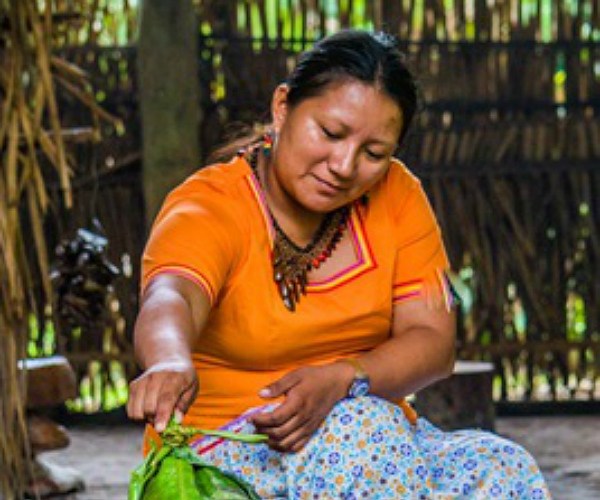 But sustenance goes far beyond feeding our bodies; it also feeds our souls. Amazonian cultures have known this since time immemorial. To help you get back in touch with such ancient knowledge, you have to try drinking Guayusa tea. A medicine woman acts as a guide through an authentic Guayusada ritual which is said to feed, cleanse, and rejuvenate the soul. You are invited to describe dreams you have had in order to have their meanings interpreted and get practical, personalized advise to help your spirit heal and grow.
But sustenance goes far beyond feeding our bodies; it also feeds our souls. Amazonian cultures have known this since time immemorial. To help you get back in touch with such ancient knowledge, you have to try drinking Guayusa tea. A medicine woman acts as a guide through an authentic Guayusada ritual which is said to feed, cleanse, and rejuvenate the soul. You are invited to describe dreams you have had in order to have their meanings interpreted and get practical, personalized advise to help your spirit heal and grow.
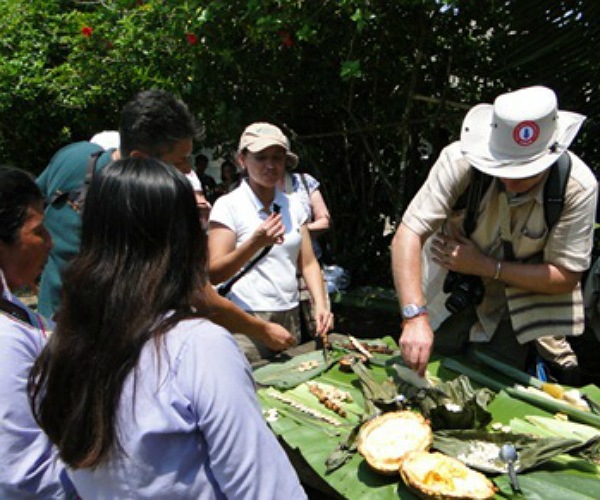 This plant does not grow anywhere else on Earth, so drinking a natural infusion of its leaves is very special. The plant is sacred to the Kichwa because of its historic cultural significance based on its natural health benefits and healing properties. Guayusa is full of caffeine which, if you’ve ever enjoyed a cup of coffee or steeped tea, you know is invaluable especially first thing in the morning! This tea’s short-term effects give you an overall sense of well-being and happiness because it helps kick your metabolism into gear and energize your body for the day ahead. In the long-term, its anti-inflammatory effect soothes conditions caused by inflammation such as the symptoms of arthritis. These positive spiritual and physiological effects are exactly what you need to rejuvenate both mind and body, and escape the winter blues.
This plant does not grow anywhere else on Earth, so drinking a natural infusion of its leaves is very special. The plant is sacred to the Kichwa because of its historic cultural significance based on its natural health benefits and healing properties. Guayusa is full of caffeine which, if you’ve ever enjoyed a cup of coffee or steeped tea, you know is invaluable especially first thing in the morning! This tea’s short-term effects give you an overall sense of well-being and happiness because it helps kick your metabolism into gear and energize your body for the day ahead. In the long-term, its anti-inflammatory effect soothes conditions caused by inflammation such as the symptoms of arthritis. These positive spiritual and physiological effects are exactly what you need to rejuvenate both mind and body, and escape the winter blues.
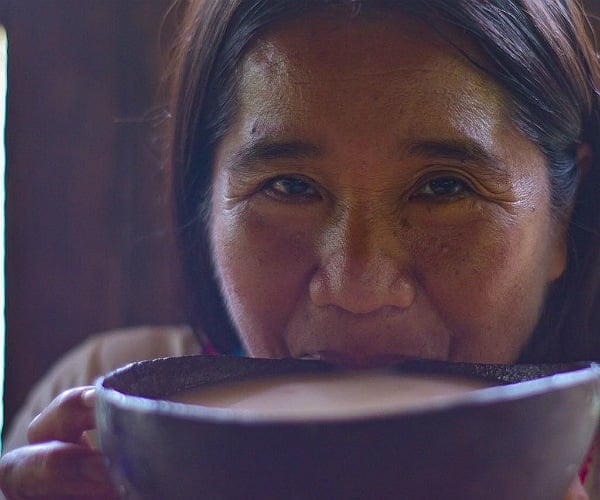 Food can be a key way to connect with strangers on a personal level and learn a little about other unique cultures. So no matter which far-flung corner of the world you visit on your next big trip, remember to bring your appetite for adventure! Your senses of sight, sound, smell, touch, and taste will thank you for many years to come.
Miguel Andy is General Manager of Napo Wildlife Center. Napo Wildlife Center is an eco-lodge offering unforgettable experiences in the Amazon rainforest of Ecuador, inside Yasuni Biosphere Reserve, which is managed by the Añangu kichwa aboriginal community.
If you would like to be a guest blogger on A Luxury Travel Blog in order to raise your profile, please contact us.
Food can be a key way to connect with strangers on a personal level and learn a little about other unique cultures. So no matter which far-flung corner of the world you visit on your next big trip, remember to bring your appetite for adventure! Your senses of sight, sound, smell, touch, and taste will thank you for many years to come.
Miguel Andy is General Manager of Napo Wildlife Center. Napo Wildlife Center is an eco-lodge offering unforgettable experiences in the Amazon rainforest of Ecuador, inside Yasuni Biosphere Reserve, which is managed by the Añangu kichwa aboriginal community.
If you would like to be a guest blogger on A Luxury Travel Blog in order to raise your profile, please contact us.Did you enjoy this article?
Receive similar content direct to your inbox.


Exactly! Always eat local. I can never understand people who travel and then eat in global franchises. Why fly all that way to sit in a McDonalds?
Hahah yes! I totally agree. I do think it can be reassuring to have some foods ‘from home’ for those with certain requirements as it’s hard finding things that suit if you have allergies or illnesses. But I couldn’t holiday somewhere and just head straight for the nearest KFC or McDonalds every time, that’s such a waste of experience!
That´s right!!, eating local is part of the holiday it self!! I reckon is different if you go to somewhere for a couple of months or years, as you may want to try something from your place. As far as you are assured food fulfils your dietary requirements, I always suggest local.
It’s a sad time to be a picky eater! I love trying whatever the local dishes are when I travel. Totally agree that it connects people. It’s more authentic, it gives you that sense of engagement to the area and the people and the way of life. If you don’t think you’ll like something it doesn’t really matter. At least you will have tried it. Better than not giving it a go and regretting missing out on the experience later.
Completely agree with you Jo!, eating local will give you a connection not only with locals, but with local area too. Flavours that are produced in local vegetables, local fruits, mixtures that local people have found. Sometimes it would see complicated to try something, but as you say…you have to at least try it!!!, it may tastes good!!
Food is good at bringing people together. I like eating at places with communal tables which help to get people talking. Talking to both the locals and learning from other travellers is all part of the experience for me.
Hello Steve, thank you very much for your comment. Sharing food is actually a very enriching moment, to share ideas and knowledge. Even more if you visit an ancient culture with deep commitment with nature around them.
It’s getting to theatre horrible time of year when the damp aggravates my arthritis. Maybe I should investigate Guayusa. Not much else has helped.
Hello Jeff, thank you for participating. Not that sure about Wayusa and its action against arthritis. However, ancient indigenous used to use it for many things, like protecting their teeth. It might be a good idea to investigate or even try it.
I’ve been travelling many parts of the world for quite a few years and I can say that food is really one of the ways to immerse yourself in your destination’s culture. After all, food is a basic necessity and most cultures pass down recipes from their ancestors. That is why I make sure I get to taste the national dish every time I travel.
Hello, thank you for your comment. It is totally true, local flavours and local mixtures are a must when visiting some place. It would help you to better understand culture and even nature around. Some dishes are prepared on different moments through the year, and that has an explanation too, so understanding it will definetly immerse on what a destination really is.
It’s not just me, I’ve noticed that for more and more people food is becoming such a huge consideration when they are organising their travel. Food is how you get to know a place.
I’m hoping that the days of the international buffet with lots of bland and characterless salads are on their way out. A couple of show-cooking stations fool very few people.
Nowadays most of us want authenticity. It doesn’t always have to be expensively sourced, what we want is food that makes us feel that we are sharing a way of life with the locals.